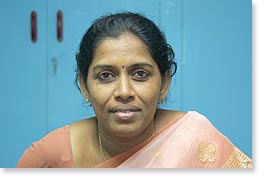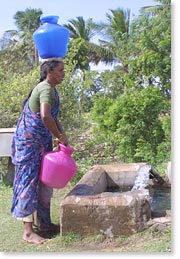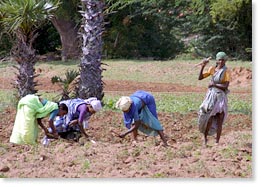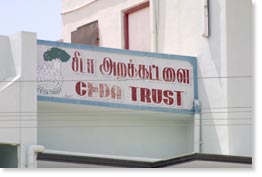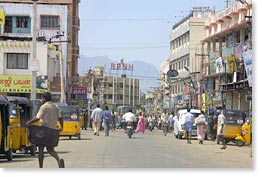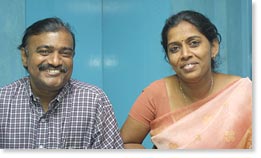|
Interview with Backiam of CEDA Trust Women Organize in Tamil Nadu Villages “Only confidence will save them from their slavery” Translated by Tony L. Antonysamy Dindigul, Tamil Nadu, India
In Motion Magazine: Please tell me about the work that you are doing. Backiam: We have been working in Reddiarchatiram and Palani in Dindigul District among the women and we have organized the women into Sangams, that is associations. The purpose of forming these sangams is that the women not only should become economically well, but also should be able to solve their problems collectively. The women all over the world are treated as secondary people, even here. As women there may not be any difference in kinds of problems, but we have certain specific problems here. “Those elephants convince this new elephant” In the case of literacy, the women are mostly illiterate. At the same time, some of the men are also illiterate but when it comes to work the women have to contribute to all kinds of work in the domestic avenue as well as in the work areas. The women, socially, are not recognized to come out of their home, come to common places, or go outside -- whereas men have the freedom to go. When it comes to employment, the women are allowed to go and take up all sorts of work because they bring money to the family. The situation is so contradictory that the women are asked to do all kinds of works both in the house as well as in their work places, whereas the men are free. The women have to look after the domestic work, look after the children, look after the garden, look after the husband, look after the in-laws, and in addition to that they have to go to the agricultural field for work to bring income to the family. This is a contradictory situation where women are forced to do all kinds of work. In fact, the irony is that the women are made up to accept that they have to look after the family; they have to look after the domestic work; they have to look after the children; they have to go to work; and they also have to satisfy the husband and other family members, in-laws. The women themselves have been made to accept this fact. For example, if you see the people catching elephants, they get a pit and they cover it and they make it that the little elephant falls into the pit. Then, immediately, it shouts and the other elephants come and try to lift the small one but they cannot do it so they go away. Immediately, the people who catch the elephant they take it and then they see that it is getting accustomed to other situations. They make use of the other elephants, which have already been tuned to their own instructions. Those elephants convince this new elephant so that this new one becomes the eleventh among the tent. Like that, the women in the family they themselves teach the children, and teach both men and women, girl children and male children, that women are to be like this. It is our fate. Women have to do all these responsibilities. Even the behavior, the culture, everything is like that so that the elder women tune the younger ones. There are many restrictions on women even for simple things. A woman should not laugh. Women should not scold. Women have to abide by the rules set by the family or husband. And even if the woman is educated then the educated woman should not show that she is educated. If she raises her voice, then she is looked down on, or she is put down. She is expected to do certain things. A woman has to show a different face to different people, a different face to different circumstances. The woman is not able to live like a woman as she is. She has to have so many masks according to different situations. In order to solve this problem, the women have to first know what situation they are living in. Why they are asked to live in this condition. Second, after knowing consciously all these things, they should come together, get organized. Only then there can be a change in their life. If you take the family situation, the situation is in such a way that there they are not even able to identify that they are being subjugated. It’s like if you take the family, it’s like the husband is like a sun. The sun’s rays are reflected in the family members. The family members are like stars and their stars reflect the light of the sun. The stars don’t have their own original things. To the family, a woman member likes to project as if she is good to her sister-in-law; she is good to her mother-in-law; she is good to her husband; she is good to her son; she is good to their dead family members. All the time goes away in fulfilling or satisfying everybody in the family. All her thinking, and all the time, she thinks of these things. Ultimately, she doesn’t understand she is living in this condition. This is the way in which Indian women, or in our area, are living. The kinds of problems that women face are peculiar. For example, in a cinema theater there was a quarrel between two men on some issue, getting a ticket or something else. These two fellows were quarrelling and one person said to the other, “I will see that you are finished. I will see that you are victimized and I will know how to do it”. So, challenging this fellow, the person who challenged the other one straight away came to the house of the other person. The wife of that person was inside the house and this fellow knocked in the door and came in and started stripping her sari and started assaulting her and misbehaving with her. This woman didn’t even know who this fellow is. She started shouting and the fellow put his leg on the throat of the woman so that she doesn’t shout. But by the time the nearby people came in, they opened the door, and shouted, and saw the scene, that fellow was chased away. In the evening, the husband and the father-in-law of the girl come and came to know that that fellow came to the house and he was misbehaving with his wife and in-law. But those fellows, instead of asking what happened, and things like that, they started doubting the wife. “Why that particular fellow came to you?” “That means you and he have some relationship so I won’t live with you.” Immediately, that evening, these two fellows, the husband and father-in-law, chased the girl to go to her own house. So, this woman didn’t know what to do. This girl came to the other women of the sangam and she complained about the situation and the women sangam discussed the issue and found that the problem was with the husband and father-in-law. Those two should have asked the other person why that fellow came in, why the quarrel took place in the cinema theater and all those things. The sangam decided to ask these questions. Then the girl told everything and the sangam said, “OK, this case has to be taken to the police and that fellow has to be punished. Not the woman has to be punished. The husband and the father-in-law didn’t have sense to reason out things. We should go to the police station and resolve these things.” That’s how now the issue is in the police station. So if we take another issue, violence against the girl-child in terms of rape. In one incident a five-year-old girl was raped … the neighborhood people found the boy and got hold of him and he was handed over to the police and the police filed a case against him. All the women sangams, federations, and other civil organizations sent telegrams, letters, and signature campaigns to the judge saying that this fellow has done such a mistake, and it is a crime against a child so this fellow should not be sent out on bail, and severe sections should be booked. This fellow should be punished. He was in jail for several months but the mother spent a lakh of rupees and got him bail and got the boy out of the jail. In the meantime, the mother (of the man) ar went ranged marriage with another young girl. And this culprit got married with the girl. The trial on while his wife gave birth to a child. Later, the court verdict came and he was sentenced to imprisonment. That fellow was taken to jail. So, even the girl’s family, in spite of knowing that this fellow has raped a girl and there is a case against him, in spite of all these things, they married their daughter to this fellow. The kind of culture that has been developed is once you have a girl child then you have to get her married, some way to get rid of the girl, from your family. The ultimate aim for a girl to live in this world is to get married to someone. These kinds of things, this kind of culture value system, are prevailing in this country. But, with the women’s sangams, federations we are fighting against these kinds of injustices and getting justice to the victims. In Motion Magazine: How many villages are you organizing in? Backiam: More than 6000 members in more than 50 villages. In Motion Magazine: How does that organizing work? Backiam: We have field workers and they cover all the villages. In Motion Magazine: How do they start to organize? Backiam: We make an analysis of the situation in the villages. We identify the issues that village people face. We categorize the issues that the villagers face: basic amenities like drinking water, road, electricity, transportation, like that. We categorize issues related to health and issues related to common resources. We focus more on issues that women face and especially the children face. We make a study and we make a survey. We have personal interactions and we analyze the issues and then we decide that we should work in these villages. CEDA Trust has a staff team making daily field visits to these villages. They go and meet the women. They talk to them. They find out their problems and they build a rapport with the women. Usually, when we go to the villages, when we get identified with the women, the women pour out things. They share their problems because they don’t have anybody to share these things with. The staff members get accustomed to the village women and then they meet individual women. They collect individual women to a place and they commonly speak to them about the issues which they already share. They discuss, “Should we do something about these issues or should we remain like this as we were doing?” Immediately, the women will say, “No, no, we should do something.” Then the staff members tell them, “OK, why not come together as a group?” Then they will ask, “Together as a group means what do we do?” Then we say, “We come as a collective. We form an association.” Then we name our association. Then we discuss issues. Then we go to government departments to discuss about the basic amenities issues. Like that they slowly talk with them and then share their issues. Then they start addressing issues collectively. This is how the staff team goes to each and every village. In each village these things happen. Then, we work with the Panchayats (a democratic local government council representing several villages). In all these clusters of villages we bring the women together and we collectively talk to them and share similar case studies. We tell them that, “You are not the only women who have problems. There are also other women who have similar problems. All the women have to come together as a group, as a collective, as a federation. Only then you will be able to solve your problems. If you are alone, if you are individuals, it is very difficult to solve your problems. Only if you come as a collective, as a group, then you can solve these problems.” Then they understand the issues. Then they come together. We offer trainings to them and tell them what gender issues are. Why the women are culturally living in this situation. Why there is gender discrimination. Why there is women-child discrimination. Why the basic amenities are not done in the villages. All these kinds of questions and problems are discussed. That’s how the women are sensitized. They see that we have to function together in order to solve our problems. We also do organize economically in order to up-bring their life. We encourage them to involve in savings. So every woman saves, say ten rupees a week, forty rupees a month. Everyone saves. And those who are in dire need they take an amount as a loan, at say 18% interest, and then they repay the loan in regular installments. That money goes to other women. Like that they save. From CEDA Trust we give them a matching grant, from a revolving fund. Then that amount increases. They take loans and they start small shops. They buy a goat. They get loans for their agriculture. Like that, they slowly build up their asset base. Slowly, they build their confidence. So, similarly they take up women issues. They succeed in some issues. That brings them confidence. That brings them together and then they see that we can even tackle larger problems. And other problems also come. Even, they take up violence against women. Even, if there is a quarrel within their family, between husband and wife, the issue is brought to the sangam. The sangam’s leaders sit with the family. They give counseling. If the husband is not obliging they even sometimes threaten them that if you are not doing it then we will take action against you. So these kinds of things, this is how the staff team and the sangams work together and solve these kinds of issues. Into a federation, into a movement In Motion Magazine: How long has this organizing been going on? Backiam: Since ’92. Tony L. Antonysamy: In 1992, we started first working with the child laborers. We were organizing non-formal education classes in the evening for the child laborers to become literates. Also we were organizing some sports, some creative activities, so that they enjoy their childhood. We started working with children and then saw that the problems that children face are not only problems of children. They are the problems of the families. Then we saw that the problems of the families are not only the problems of the family, they are the problems of the village. Then, we saw that these issues in the villages are not the issues of the village alone, they are everywhere in the society. This is how we started bringing them together and making them understand that things are linked in socio-economic, political, cultural situations, contexts and structures. Once we understand that, only then will be able to address the issues, to make them understand how the society functions, the cultural aspects, the social aspects, the economic aspects, the political aspects. This is how we educate them, and sensitize them, conscientize them, and bring them to the group. It took us nearly ten years to bring the women into a federation, into a movement, and address these kinds of violation issues. Questioning, educating, convincing In Motion Magazine: Have you seen the women changing? Backiam: There are changes in the lives of the women. If you say that there is domestic violence in every house, now the women sangam members have started questioning that domestic violence. Why should we be punished? Why should we be beaten up? Why should we be scolded? Now they have started questioning the domestic violence. Second, is that they have started educating the children. They have started more focusing on the female children. “Why should we only treat male children?” They have started giving equality between the male child and the female child. Now the women have started thinking that we should not beat the children because children also have their rights. These kinds of changes are coming. Tony L. Antonysamy: Another thing is that the women in the family not only start questioning the in-laws or the husband, or the mother-in-law, the father-in-law, now they have also started convincing them why they should not do that. It’s not only questioning them but also convincing them not to do that. In this way they don’t only play a confrontational role but they play a convincing role and then they make them understand that any of them can live in the family. Backiam: If you take the economic sphere there are also changes. So far they have been under the clutches of private moneylenders because they don’t get employment throughout the year. It’s not regular and the wages are not high. They are very low wages. The income was not enough for the family so ultimately they have had to go to the private moneylenders. They have to get the money for high rate of interest. And they could not even come out of this vicious cycle. But now, after joining the sangam, after involving in savings, they have started getting assets in their names. The economic situation is becoming a little better. They are not depending too much on the moneylenders. Now they have their own income-generation program. They get the income day-by-day, little-by-little increasing. Now they are getting self-confidence. Now they have got an economic base. Now they are able to spend their money for their children’s education, especially for female children’s education. So these kinds of changes have come. When we talk of women’s liberation, my proposition is that the women should focus more on reading books, reading magazines, so that they come to know what is happening in the world. Only when they become literates and start reading books, magazines, and they start thinking about themselves, can they change their perspective. Through that they can meaningfully express their own feelings. I emphasize that women should start reading books and express their feelings and their experiences. Only then will women feel changes in their lives. The women should develop confidence in themselves. Only confidence will save them from their slavery because if you take all the work that women do at home, if you put a simple value for that, it will come to more than 6,000 rupees a month. She is contributing so much to the family but she feels that she is not contributing to the family. But really she is contributing more. If they think that we are also contributing, if they feel that we are confident, then really change can appear in women’s life. If women stopped working then two thirds of the work in the world will not function – such is the women’s power, the women’s contribution. Why should we make our contribution go to waste? Let us build confidence that we are contributing so we can make changes. We are making changes. This confidence will certainly bring change in the life of women. Published in In Motion Magazine March 20, 2004 Also see:
|
If you have any thoughts on this or would like to contribute to an ongoing discussion in the  What is New? || Affirmative Action || Art Changes || Autonomy: Chiapas - California || Community Images || Education Rights || E-mail, Opinions and Discussion || En español || Essays from Ireland || Global Eyes || Healthcare || Human Rights/Civil Rights || Piri Thomas || Photo of the Week || QA: Interviews || Region || Rural America || Search || Donate || To be notified of new articles || Survey || In Motion Magazine's Store || In Motion Magazine Staff || In Unity Book of Photos || Links Around The World NPC Productions Copyright © 1995-2018 NPC Productions as a compilation. All Rights Reserved. |


